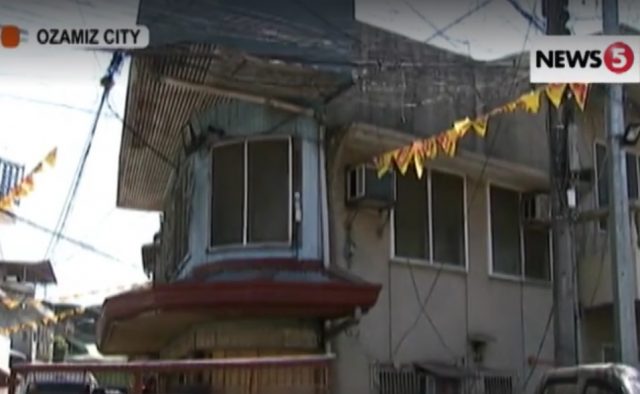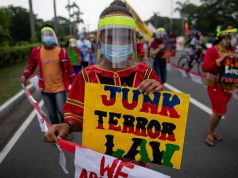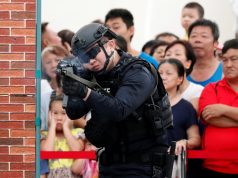MANILA, Philippines — The deaths of Ozamiz City Mayor Reynaldo Parojinog and 15 other persons, including his wife and two siblings, in simultaneous early morning raids on his and relatives’ homes and properties has raised questions about whether proper procedure was followed.
The Ozamiz City police and the Criminal Investigation and Detection Group in Region 10 were armed with six search warrants when they arrived at Mayor Parojinog’s home at 2:30 a.m. Sunday, according to Misamis Occidental police director Senior Superintendent Jaysen de Guzman.
Because the police were supposedly greeted with gunfire, they were forced to retaliate, the firefight lasting for an hour and a half, he said.
At 4:00 a.m., said de Guzman, the police went to the home of the mayor’s brother, provincial board member Octavio Parojinog Jr., and the family’s two farms, where shootouts also allegedly broke out.
When the smoke cleared, the mayor and his brother, the mayor’s sister Mona and wife Susan, were among the 15 fatalities. Another person died of injuries later, bringing the total toll to 16.
Among those arrested were the mayor’s children, Ozamiz Vice Mayor Nova Princess Parojinog and Reynaldo Jr. Another son, Ricardo, the city’s first councilor and also a target of the raids, has apparently gone into hiding.
Among the many questions raised about the raid and its aftermath were about why search warrants had to be served in the wee hours, during what was later learned was a power outage and police confirming they had turned off close circuit television security systems at the raided houses.
What exactly does the law say about search warrants and how they are supposed to be served?
Rule 126 of the Rules of Court states:
“Section 9. Time of making search. – The warrant must direct that it be served in the daytime, unless the affidavit asserts that the property is on the person or in the place ordered to be searched, in which case a direction may be inserted that it be served at any time of the day or night.”
What is a search warrant?
Rule 126 says it is “an order in writing issued in the name of the People of the Philippines, signed by a judge and directed to a peace officer, commanding him to search for personal property described therein and bring it before the court.”
Officers have the right to break doors and windows so the search can be done.
Section 7 reads: “The officer, if refused admittance to the place of directed search after giving notice of his purpose and authority, may break open any outer or inner door or window of a house or any part of a house or anything therein to execute the warrant or liberate himself or any person lawfully aiding him when unlawfully detained therein.”
Section 8 states that two witnesses — preferably the occupant of the home or any member of the family — must be present when searching the house, room, or premises:
“No search of a house, room, or any other premise shall be made except in the presence of the lawful occupant thereof or any member of his family or in the absence of the latter, two witnesses of sufficient age and discretion residing in the same locality.”
Under Section 10, a search warrant is valid for ten days from the date it is issued.
Arrest warrants
What about arrest warrants?
“Technically, (arrest) warrants can be served any time. Technically. Because it’s a standing warrant, wherever you will see the accused or the culprit or the person in charge so that you apprehend them immediately,” said TV5 legal analyst Atty. Mel Sta. Maria in an interview.
But he also pointed to Republic Act 7348, which defines the rights of a person arrested, detained, or under custodial investigation, as well as the duties of the arresting, detaining, and investigating officers.
“One of the rights of the accused is, upon apprehension, he can call members of the family, a doctor, a priest, of course, a lawyer, and if he knows anybody, a member of a non-governmental organization accredited by the Commission on Human Rights, or an international non-governmental organization accredited by the Office of the President,” Sta. Maria said.
“The purpose of allowing the accused … to immediately get in touch with people is precisely to prevent torture,” he added, pointing out that, sans safeguards, anything may happen once a person is in police custody.
“While technically a warrant of arrest can be served anytime … it should (ideally) be served in daylight, at a time when the accused can readily coordinate with his people. Problema, alas dos, alas tres, oras na guman’yan ka, nakakatakot na ‘yan (the problem is if this happens at 2:00 a.m., 3:00 a.m., it can be scary), simply because the spirit of the law is trying to be negated,” Sta. Maria said.
“Papaano ka naman makakatawag sa paring tulog o sa lawyer na tulog, o sa isang NGO, ‘di ba (How can you even call a sleeping priest or a sleeping lawyer or an NGO, right)? It will make it very hard for you,” he said.
Asked if martial law in Mindanao might have had a bearing in the timing and conduct of the raids, Sta. Maria replied: “It is very clear in the Constitution: though Martial Law is declared or the writ of habeas corpus is suspended, the Constitution as a whole will not be suspended. What does it mean? The Bill of Rights will still be in effect.”
The Bill of Rights, or Article III of the 1987 Constitution, states:
“The right of the people to be secure in their persons, houses, papers, and effects against unreasonable searches and seizures of whatever nature and for any purpose shall be inviolable, and no search warrant or warrant of arrest shall issue except upon probable cause to be determined personally by the judge after examination under oath or affirmation of the complainant and the witnesses he may produce, and particularly describing the place to be searched and the persons or things to be seized.”
A warrant of arrest always emanates from the courts, and the judge needs to determine of a request for one is meritorious or not, according to Sta. Maria.
Robredo: We expect a thorough investigation
Asked for comment on the killing of the Parojinogs, Vice President Leni Robredo told reporters on Wednesday that she expected a thorough investigation.
“Hindi basta-basta iyong insidente na nangyari. Iyong epekto nito hindi lang sa pamilya ng mga naging biktima, pero sa buong Pilipinas. Kailangan mapakita na iyong hustisya mase-serve (It wasn’t an ordinary incident. Its effect is not just on the victims’ families, but on the entire Philippines. Justice must be served),” she said in a press statement.
At the same time, she urged a credible investigation by concerned government agencies.
“Pero hinihingi natin sa mga institusyon natin, na inaasahan natin, na huwag namang sayangin iyong ating tiwala. Na iyong imbestigasyon na gagawin, hindi naman iyong lalong makakabigay ng pagduda, lalong mas maraming katanungan iyong maibibigay. Gusto natin pagkatapos noong imbestigasyon, lahat na tanong sa isipan natin nasagot (But we ask our institutions, we expect of them, that they will not squander our trust. That the investigation that will be done won’t raise more doubts and questions. We want all the questions on our mind to be answered after the investigation),” the Vice President said.
Sta. Maria had similar thoughts: “Keep in mind, when a person dies, when a person gets hurt … the default mode must be — this means the initial reaction – ‘Somebody must answer for it. Somebody must be liable for hurting or killing somebody.’ This is why there are exemptions in the Revised Penal Code. The only exemption to be excused in hurting or killing somebody is when you’re (doing it) in self-defense,” the requirements of which are:
- There must be unlawful aggression by the attacker.
- There must be no sufficient provocation from the person defending himself or herself.
- The means to repel the attack or unlawful aggression must be proportional to the danger.
“Remember, there were [16] people killed. So this means, the danger should have been so great that you had to [kill those people]. Almost immediately, the question of proportionality comes out. This is why the newspapers are saying [the police] were thrown grenades at,” Sta. Maria said.
He stressed, however, that he was not making conclusions about what really transpired.
Rather, he said, “The situation raises more questions than answers.”
“So therefore, the police may be right, the police may be wrong. Nobody is concluding [yet]. But things like this must always be investigated, especially when [16] people died. Were the requirements of self-defense complied with? Because too many people died. So a thorough investigation must necessarily follow suit because it’s such an extraordinary situation, serving a warrant at two or three in the morning,” Sta. Maria stressed.










